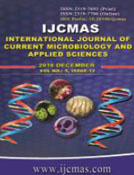


 National Academy of Agricultural Sciences (NAAS)
National Academy of Agricultural Sciences (NAAS)

|
PRINT ISSN : 2319-7692
Online ISSN : 2319-7706 Issues : 12 per year Publisher : Excellent Publishers Email : editorijcmas@gmail.com / submit@ijcmas.com Editor-in-chief: Dr.M.Prakash Index Copernicus ICV 2018: 95.39 NAAS RATING 2020: 5.38 |
Every day around 1,4 million patients world wide suffer from a infections, associated with hospitalization as a result of "dangerous" medical care. Neurosurgical patients have a high risk of postoperative infections of the central nervous system. Infections associated with multidrug - resistant strains have high mortality rates in patients with serious underlying diseases. We report a case of fatal nosocomial meningoencephalitis, caused by multidrug resistant Staphylococcus lentus – MR and pan resistance Acinetobacter baumannii. The patient was a woman of 61 years, operated in the neurosurgical clinic with correct diagnosis "Tumor cerebri" proved with cerebral computed tomography (CT). During a stay in Intensive Care Unit ( ICU ) of cerebrospinal fluid ( CSF ) were isolated Staphylococcus lentus – MR and Acinetobacter baumannii. The most of high risk factors for a patient is meeting with the same Acinetobacter baumannii strains, who was proven in the environment of the ICU. 24 days after resection of tumors patient developed clinical picture of acute meningoencephalitis and Systematic Inflamatory Response Syndrome (SIRS). Microbiologic findings includes: pan-resistance Acinetobacter baumannii strain from CSF and surgical granulations. In summary, we present a patient developed nosocomial meningoencephalitis, after resection of brain tumors associated with multi-resistant bacterial flora. The involvement of multiple risk factors associated with basic disease, gaps in care and inappropriate antibiotic therapy conducted, resulting in the emergence of pan - resistance Acinetobacter baumannii strains are responsible for the development of SIRS finished fatal.
 |
 |
 |
 |
 |